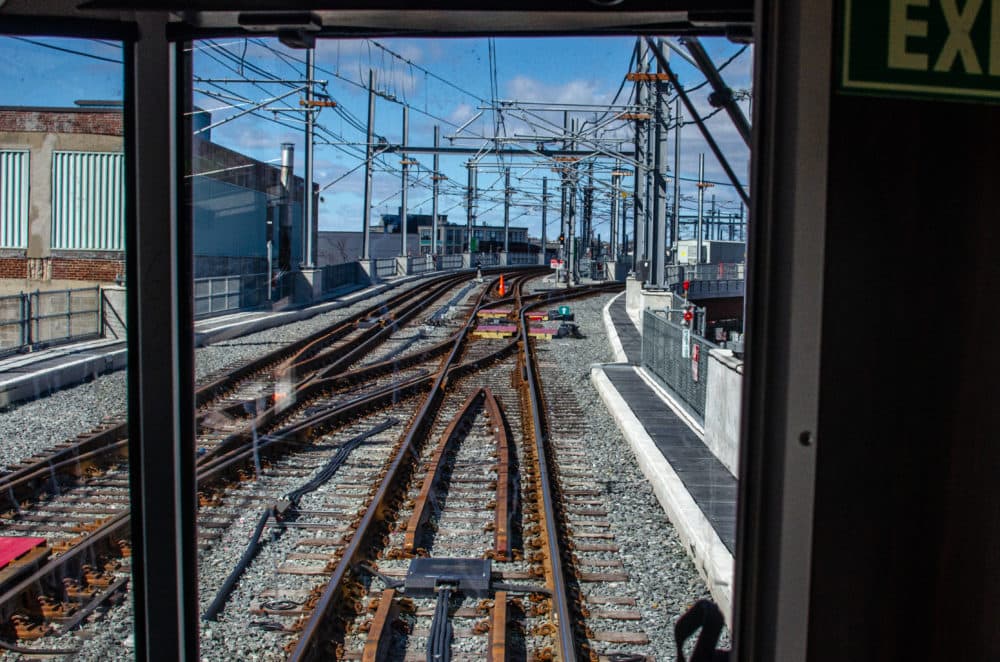Advertisement
3 things the MBTA is focused on fixing or improving

As malfunctions and setbacks continue to plague the MBTA, officials sought to reassure the Board of Directors on Tuesday that the system has a plan to get back on track. Here's a few takeaways:
1. A potential fix for the Green Line Extension
Miles of tracks that are too narrow across the Green Line Extension could be fixed by mid-November following up to two weeks of evening closures, MBTA General Manager Phil Eng said Tuesday.
Days after he revealed that most of the brand-new rails on the extension need to be widened, Eng told agency overseers the contractors responsible for the project have proposed tackling the problems in 10 to 14 nights of work starting around Nov. 1.
Green Line Extension Constructors, the joint venture that built the 4.4-mile expansion, suggested shutting down service on the rails from 9 p.m. each night until 5 a.m. the following morning during that span, Eng said. Regular service would resume each day following the overnight work.
Eng said his team is still reviewing the proposal and has not yet committed to it.
"This is not going to be something that continues on for months and months, or even longer. It is something that can be addressed in a matter of weeks," Eng told the MBTA's Board of Directors.
An MBTA spokesperson said there's no estimate available yet for how much the repair work will cost. Both Eng and Gov. Maura Healey signaled last week they want the contractors to foot the bill.
2. A contract 'reset' for new Red and Orange line cars
MBTA General Manager Phil Eng said the T has received 94 of 152 promised Orange Line cars and 14 of 252 expected Red Line cars under its contract with Chinese firm CRRC.
While officials work to "reset this contract" following a series of delays and malfunctions, Eng said recently completed vehicles "continue to exceed the contract requirements" for safety and quality.
"They have committed to delivering this, and I believe that what we're seeing is a spirit of partnership," Eng told the MBTA's Board of Directors.
CRRC added "senior management from China" to its assembly facility in Springfield, Eng said, calling it "a key part" of recent improvements.
The company, which signed contracts worth nearly $900 million with the T as part of an effort that began under Gov. Deval Patrick to improve capacity and frequency on the pair of subway lines, has repeatedly failed to deliver subway cars on time, falling years behind schedule. It has blamed they delay on several problems, including manufacturing issues and pandemic-fueled supply chain hiccups.
Advertisement
CRRC was originally expected to deliver all Orange Line cars by January 2022 and all Red Line cars by September 2023. The most recent update punted those dates to December 2023 for the Orange Line and September 2026 for the Red Line, though T officials have said even those dates are subject to delay.
Jeff Gonneville, the T's deputy general manager whom Eng tapped to serve as "lead negotiator" with CRRC, previously said the contracts include a clause incurring damages of $500 per car per day late.
Without elaborating, Eng said Tuesday that "there are liquidated damages that are being accrued as a result of the schedule."
3. Restarting the delayed bus service overhaul
MBTA officials are hopeful they can revive a delayed effort to overhaul and expand the bus network by the end of next year.
Officials rolled out a plan for the bus system transformation in the spring of 2022, but questions quickly emerged over whether they could afford the additional spending it would require or had enough employees to accommodate a significant increase in service. Agency managers have also been grappling with serious labor shortages and safety issues on its subway system.
MBTA Chief of Operations Planning, Scheduling and Strategy Kat Benesh told the agency's board the bus project had been "on pause due to the operator shortage."
"We have reduced bus service, I want to say, by more than 10% since COVID, and that's largely due to number of operators," Benesh said. "We've always said since March 2020 that when we rebuild the network, it will look different than it did in February 2020."
Applications for bus driver positions have surged in recent weeks after officials approved a new collective bargaining agreement that features an 18% pay increase, $7,500 sign-on bonuses and paid commercial driver's license training.
The T on Tuesday published a new "Bus Priority Toolkit" that officials say outlines priorities for installing bus lanes and upgrading signal systems to have the greatest impact.
With reporting and writing by State House News Service's Chris Lisinski